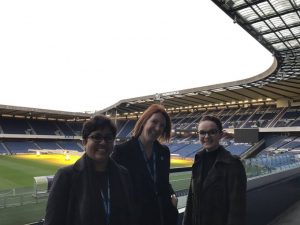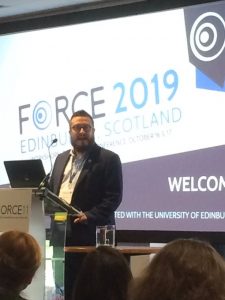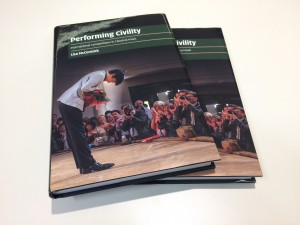
On Monday I attended the COPE (Committee on Publication Ethics) European Seminar in Leiden. Cope has been around for over 20 years, and began as a relatively informal group of concerned journal editors, and has grown since then into an organisation supporting editors, authors, peer-reviewers and publishers. COPE intends to start a programme for university members as part of its new strategic plan. Publishers and editors who raise ethical issues with universities often are faced with a wall of silence and are not informed about the outcomes of investigations, as universities seek to maintain privacy. What follows are some notes on the discussions of the four of the main topics covered at Monday’s seminar.
Text Recycling
The first session of the day looked at Text Recycling – and the findings of some research undertaken in the US through the Text Recycling Research Project – textrecycling.org.
Text recycling is ethically neutral – sometimes it is appropriate and is not always inherently inappropriate. It is often known as ‘self-plagiarism’ – but as one publisher later remarked – sometime the ‘self-‘ part is lost and people end up discussion plagiarism, which is quite distinct from text recycling.
The research surveyed around 300 editors of top journals across STEM, social sciences and humanities. The responses indicate that editors apply different standards as editors than they do when they are authors.
Copyright law is inherently jurisdictional. Across most jurisdictions, there are no laws which address the issue of text recycling. Scholarly publications were not the publications people has in mind when they were designing the copyright laws. Almost universally, authors are the initial holders of rights in their work – with the exception of a handful of universities with assert ownership. But, authors transfer rights to publishers. This makes it difficult for authors to be able to re-use work in a publication by a different publisher. Fair use could cover this so we need to make sure that authors use their rights on fair dealing as asking for permission when it isn’t necessary erodes authors rights and sets new legal precedents. Once example was given from the publishing contact of the New England Journal of Medicine which actually cited US Fair Use law in the contract – but how would that apply to an author from another jurisdiction?
The next phase of the work will be looking at model guidelines, contracts, policies etc., which can be adopted by anyone. So – there will be more to come on this.
Predatory Publishing
Defining predatory publishing is a problematic activity because new journals and young journals will have similar practices. In practice – there are a number of reasons why predatory publishers continue to operate. Authors whose English is not that good find it harder to get published in reputable journals. Reviewers can’t be bothered to work through broken English so good research is overlooked because of language issues. International pressure on rankings means authors are under pressure to publish and some researchers hope that recruitment panels won’t look in too much details at the venue and just count the publications on a CV.
So, what is to be done? COPE was behind the Think. Check. Submit. initiative to encourage authors to be aware of predatory or bogus journals. In 2019, the Federal Trade Commission in the US took OMICS to court and they received a fine of $50.1M. There is definitely a role for institutions to play in helping to educate authors.
Countries have become globally competitive about the status of their universities. Makes a job that should be a passion and a love, and turns it into some crazy thing. We can’t expect everyone to publish in top-citation English language journals.
Predatory publishing is a large problem and is centred in India in the Hyderabad region. At one recent meeting, a representative of one organisation which publishes everything it receives, made a representation that they thought that COPE was causing the elitist system through insisting on the application of peer review! He thought they were giving more researchers a voice by publishing everything. So, this shows that there are genuinely-felt differences of viewpoint on this matter.
Retraction Guidelines Update
There will be separate guidance for expressions of concern, letters to the editor and commentaries, and for corrigenda and errata. The main purpose of retraction is to correct the literature and to retain the integrity of the research record and not to punish authors. Unreliable data could result from honest mistakes, naive errors or research malpractice.
Partial retractions are not helpful as they call the whole article into question. Corrections are a better route to follow. Sometimes editors can jump straight to retraction before considering all the options available to them.
People worry that retractions undermine science but actually it is part of the process of earning and maintaining trust. Elsevier point out that people only have to deal with these issues very rarely, so it’s important to have clear guidance. If an article is in a subscription journal they make it open access on retraction. We need to recognise that misconduct is a systematic characteristic of science. Retractions get a lot of attention – but it is not always the best approach. Elsevier retract about 200-220 articles per years – so about 1 in 5000.
At Elsevier, all retractions need to be approved by a panel of three Elsevier staff. It is an Editor’s decision to retract, if approved by the staff. There is also a “tombstone process” so that readers can see what was once there. Elsevier use a series of templates for editors to use in the retraction process and authors always are informed.
Editors need to be aware that they do not necessarily understand all the pressures people are under and that they don’t know what else is going on in their loves. Also, that they don’t know what the impact of this retraction will be – but that it is very likely to have an impact on the author’s career.
Ben Goldacre is working on “retract-o-bot”. https://ebmdatalab.net/retractobot/ This should alert authors when an article they cite is retracted.
One audience member pointed out that universities are gaming the publication system – publish or perish and the whole impact factor “fetish” has gone too far. This is one of the reasons why COPE is seeking to get universities as members, although it is also recognised that these concepts are very deeply ingrained in many institutions and disciplines. Some EU funder panels are now insisting that applicants do not use H-index and impact factors in application forms and CVs – so change may start to come.
Ethical Considerations for Arts, Humanities and Social Sciences Editors
COPE has commissioned some work to be done with Routledge to better understand the ethics challenges faced by AHSS journal editors. COPE was previously perceived as being very STM focussed and this is something they wish to change.
The most widespread ethical problem in AHSS publishing is addressing language and writing-quality barriers whilst remaining inclusive. In AHSS we are not just dealing with data all the time but with people’s opinions – so disputes can be much more inflammatory. There have been issues with hoax articles with people trying to discredit gender and identity studies. There is also a problem of tensions between quality and global representation – more attention should be paid to peer-reviewer diversity. Political differences between authors and editors can be very problematic for journals. There are currently few opportunities for mentoring of early-career researchers in publication ethics in AHSS subjects – something which should be improved.
From my point of view there is considerable scope for research libraries, and in particular those of us working in scholarly communications to take more of a lead to engage our authors with the ethical matters to do with publication, peer-review and editorial activities, and this is something I shall be seeking to develop with the team at Edinburgh.
-Dominic Tate, Head of Library Research Support








 The Scholarly Communications Team estimates that staff at the University of Edinburgh write, edit or contribute to over 500 books annually and the Library aspires to hold two copies of each of these books (one for general loan, one for preservation). In light of this aspiration, Edinburgh University Library has developed a
The Scholarly Communications Team estimates that staff at the University of Edinburgh write, edit or contribute to over 500 books annually and the Library aspires to hold two copies of each of these books (one for general loan, one for preservation). In light of this aspiration, Edinburgh University Library has developed a